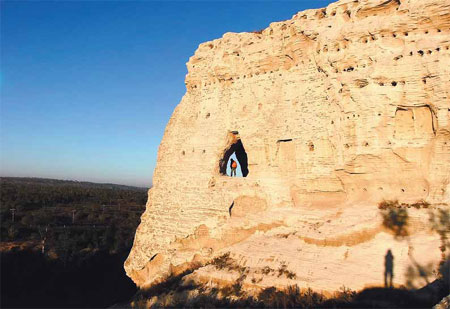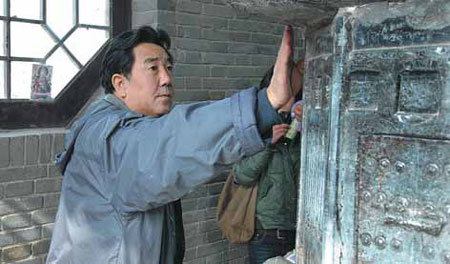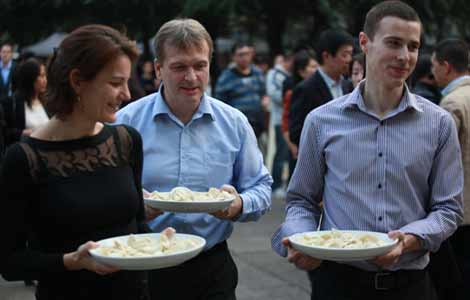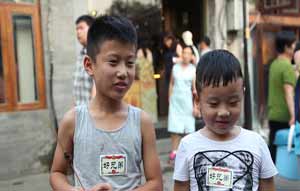History's forgotten chapter revived
Updated: 2013-09-24 06:41
By Liu Jun (China Daily)
|
||||||||
Around the time when Attila the Hun was besieging Rome, Helian Bobo was wreaking havoc across China. Now an account of this fascinating period has been translated into English. Liu Jun reports.
Readers interested in Chinese history and the Hun cavaliers can learn more about the turbulent 4th and 5th centuries in an English version of a Chinese novel to be published in November.
Gao Jianqun, an author based in Xi'an, Shaanxi province, has made an impressive attempt to capture a long neglected part of history in his latest novel Tongwan City.
The book features two legendary figures: Helian Bobo, last chieftain of the southern Xiongnu tribe, and Kumarajiva, a Buddhist master whose teaching and translation helped lay the foundation of the Mahayana School of Buddhism in China.
"Many Westerners knew about Attila, the Hun leader who almost felled the Roman Empire. Tongwan City is essentially about the same people around the same time except that this horde of Huns wrought havoc half a world away," Mu Xiaoliang, who translated the book into English for New York-based CN Times Books, says.
|
Tongwan city in Shaanxi province was home to the rich history of the Xiongnu cavaliers about 1,500 years ago. Photos Provided to China Daily |
|
Gao Jianqun visits the pagoda where the sarira of Kumarajiva's tongue is said to be enshrined at the Caotang Temple in Xi'an. The author of Tongwan City has drawn rich inspiration from his historical research and extensive travels in Northwest China. |
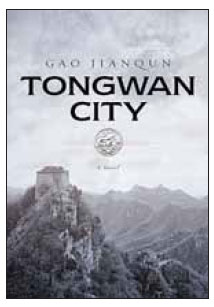
"I think Western readers will find the book charmingly familiar. The story itself is very Shakespearian. It is a tragedy about revenge and treachery. Tongwan City also has an admirable but flawed protagonist who finds it hard to tell good from evil."
Helian Bobo, who resurrected the diminishing southern Xiongnu branch, occupied much of the Yellow River's middle reaches with cunning, patience, an iron will and iron hoofs.
On his orders, some 100,000 laborers toiled day and night for six years before finishing Tongwan city in today's Shaanxi province in AD 418.
Situated in an area without stones, they are said to have mixed sand with boiled millet and fresh blood - from humans and animals - to make boulders.
His opposite is Kumarajiva, who comes down the sacred altar as a real human being caught up in unbelievable hardships.
In the course of Buddhism's spread throughout China, Kumarajiva was perhaps the only Buddhist master for whom two kingdoms (Qiuci and Latter Liang) were destroyed.
He was kept under house arrest for some 17 years as the reward of the vicious ruler Lyu Guang, who forced him to marry his cousin, a princess, destroying any hopes of attaining higher enlightenment.
Despite all this, Kumarajiva left behind some of the best-known translated Buddhist classics that are chanted to this day. The Chinese Diamond Sutra, for instance, is said to exude an eloquence comparable to its original in Sanskrit.
Besides establishing vivid characters, the author also proves himself an expert in drawing a comprehensive map of the diversified landscape in Central Asia, and establishing a clear outline of the numerous regimes that popped up and down in northwestern China.
His account of the herders' life is especially convincing, down to every detail of taming, grooming and riding a wild horse. The various folk songs and dances captured in ancient poetry and frescoes along the ancient Silk Road come alive in his passionate narration.
At 59, Gao stands out among the writers of his generation with a long-lasting interest in the nomadic tribes. In his youth, he spent five years as a cavalryman at the Altay Mountains in the northern Xinjiang Uygur autonomous region.
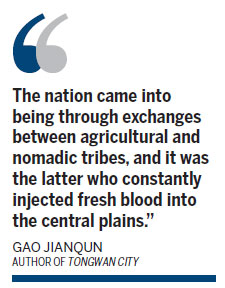
Hailed by critics as one of "three chariots" of Shaanxi province alongside Chen Zhongshi and Jia Pingwa, Gao impresses readers with an extensive knowledge of history in his writings, including the novel The Last Xiongnu (1993) and the semi-autobiography The Big Plain (2009).
"I look at the history of China from a different angle (from many other Chinese writers)," says Gao with a heavy Shaanxi accent.
"The nation came into being through exchanges between agricultural and nomadic tribes, and it was the latter who constantly injected fresh blood into the central plains."
Though he doesn't speak English, Gao has read extensively in history and Buddhism. A Study of History and Mankind and Mother Earth by British historian Arnold J. Toynbee, The Empire of the Steppes by French historian Rene Grousset, and books on Mongolian history are some of the sources that broadened his horizons.
Gao had announced that this book would be the last before he "put away his pen". However, one has to point out some flaws in the Chinese version.
Repetition could create a rhythm of sorts, but you might feel your patience wearing thin by the fourth time the author talks about some princess being married off to appease Xiongnu chieftains.
Instead of easing the reader into the story, Gao often jumps into the tale to warn readers of what's going to happen.
Throughout the book, most characters speak in contemporary Mandarin. But Helian Bobo, who was illiterate, occasionally speaks in a somewhat awkward classical form.
"Those passages come from historical records," Gao explains. "When you put them at the right scene, you get a feel of the real person."
Hopefully, these ruffles will be smoothed in the English version. Paul Harrington, vice-president and associate publisher of CN Times Books, said in an e-mail that changes would be made, "but only those absolutely necessary to make the work more easily understood and enjoyed by Western readers".
"I hope that my books will one day make it to the bookshelf of a common family in Western mainstream society," Gao says.
Contact the writer at liujun@chinadaily.com.cn.
(China Daily 09/24/2013 page19)

 Victoria Beckham S/S 2014 presented during NYFW
Victoria Beckham S/S 2014 presented during NYFW
 'Despicable' minions upset Depp's 'Lone Ranger' at box office
'Despicable' minions upset Depp's 'Lone Ranger' at box office
 'Taken 2' grabs movie box office crown
'Taken 2' grabs movie box office crown
 Rihanna's 'Diamonds' tops UK pop chart
Rihanna's 'Diamonds' tops UK pop chart
 Fans get look at vintage Rolling Stones
Fans get look at vintage Rolling Stones
 Celebrities attend Power of Women event
Celebrities attend Power of Women event
 Ang Lee breaks 'every rule' to make unlikely new Life of Pi film
Ang Lee breaks 'every rule' to make unlikely new Life of Pi film
 Rihanna almost thrown out of nightclub
Rihanna almost thrown out of nightclub
Most Viewed
Editor's Picks

|

|

|

|

|

|
Today's Top News
Going green can make good money sense
Senate leader 'confident' fiscal crisis can be averted
China's Sept CPI rose 3.1%
No new findings over Arafat's death: official
Detained US citizen dies in Egypt
Investment week kicks off in Dallas
Chinese firm joins UK airport enterprise
Trending news across China
US Weekly

|

|
